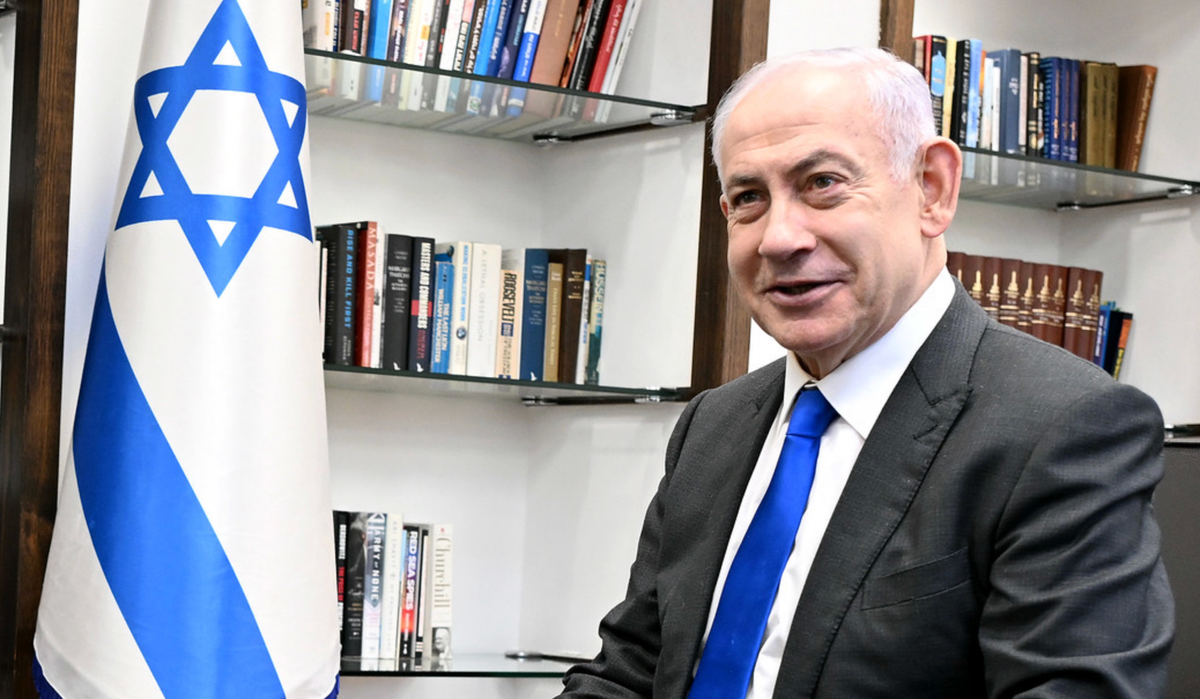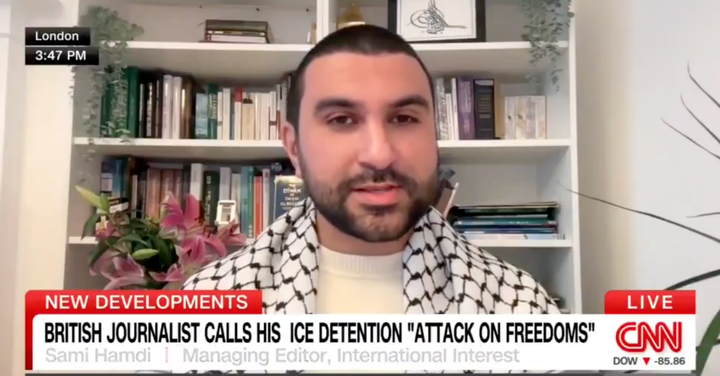Washington Welcomes Journalist Slayer Benjamin Netanyahu
The staggering number of journalists killed in the Israeli government’s war on Gaza must be front and center as the Israeli prime minister visits Washington.

The following article was made possible by paid subscribers of The Dissenter. Become a subscriber with this special offer and support independent journalism on press freedom.
As Israeli Prime Minister Benjamin Netanyahu visits Washington to address the United States Congress, the staggering number of journalists killed in the Israeli government’s war on Gaza must be front and center yet not without recognizing that the war makes freedom of the press impossible.
President Joe Biden fast-tracked the shipment of Hellfire missiles, artillery shells, tank cartridges, and 1000-pound and-2000 pound bombs. Such weapons are not only responsible for a Palestinian death toll that could be as high as 186,000, but also the deaths of more than 150 journalists and media workers and family members.
“The occupation is committing one massacre after another against Palestinian journalism, attempting to kill the witnesses of truth in an effort to obscure it and hide the voice and image of the massacres it commits against our people in all Palestinian territories, especially in the Gaza Strip,” declared the Palestinian Journalists Syndicate (PJS).
Additionally, a censorship regime imposed by the Israeli government has resulted in the arrests of more than 100 Palestinian journalists and the detention of 85 Palestinian journalists. PJS says that 52 “colleagues” remain in Israeli prisons (as of July 7).
White House and State Department officials routinely brush off questions about Israeli attacks on journalists, as if Israel is not engaged in violence that sets it apart from the vast majority of the world.
State Department deputy spokesperson Vedant Patel said in April, “Our message to the Government of Israel is the same message it is to any government on the face of this planet, which is that journalists need to be protected.”
On June 5, State Department spokesperson Matthew Miller was asked about a group of Israeli settlers that attacked Palestinian journalist Saif al-Qawasmi and journalist Nir Hasson of the Israeli newspaper Haaretz.
“So attacks of that nature should be prevented when possible, and when they can’t be prevented, they should be fully prosecuted; people should be held accountable under the law,” Miller replied.
Miller’s response was entirely detached from reality. The Israeli military does not investigate attacks on journalists—something that he is well aware of as a U.S. official.
A letter to Biden from the Committee to Protect Journalists (CPJ) and other press freedom and human rights groups called attention to the Israeli military’s “longstanding pattern of impunity” before they launched a brutal assault following Hamas’ attack on October 7, 2023.
In May 2023, CPJ documented at least 20 journalists killed by the [Israeli military] over the past 22 years, including American-Palestinian journalist Shireen Abu Akleh, and no one had ever been charged or held accountable for their deaths. The Israeli rights groups B’Tselem and Yesh Din have independently concluded that, when Israeli military’s investigations do occur, they serve as a “whitewash mechanism,” findings that are supported by other organizations such as Human Rights Watch.
Reporters Without Borders (RSF) has gathered information on the deaths of journalists in Gaza (and Lebanon) and found that 24 journalists were likely targeted by the Israeli military, especially because they were wearing press vests.
Here is RSF’s list:
Yasser Mamdouh, Kanaan news agency, correspondent (February 11, 2024)
Yazan Emad Al-Zwaidi, 27, Al-Ghad TV cameraman (January 14, 2024)
Ahmad Badir, Hadf News, 30, journalist (January 10, 2024)
Hamza al-Dahdouh, 29, Al Jazeera reporter (January 7, 2024)
Moustafa Thuraya, freelance video reporter working for Agence France-Presse (January 7, 2024)
Rami Bdeir, 34, New Press correspondent (December 15, 2023)
Samer Abu Daqqa, Al Jazeera cameraman (December 15, 2023)
Montaser Al-Sawaf, Anadolu Agency cameraman (December 1, 2023)
Asem Al-Barsh, 34, Radio Al Najah (November 21, 2023)
Farah Omar, Al Mayadeen reporter (November 21, 2023)
Rabih al-Maamari, Al Mayadeen photographer (November 21, 2023)
Ayat Khadoura, independent video blogger (November 20, 2023)
Bilal Jadallah, 45, Press House-Palestine (November 19, 2023)
Hassouna Salim, 28, Quds News journalist (November 18, 2023)
Sari Mansour, 32, Palestinian freelance journalist (November 18, 2023)
Roshdi Sarraj, 31, Ain Media (October 22, 2023)
Issam Abdallah, 37, Reuters (October 13, 2023)
Mohammed Fayez Abou Matar, 28, freelance photojournalist (October 11, 2023)
Hisham al-Nawajha, 27, Al Khamisa photojournalist (October 10, 2023)
Saeed al-Tawil, 36, Al Khamisa editor (October 10, 2023)
Mohammed Soboh, Khabar photojournalist (October 10, 2023)
Mohammad al-Salihi, 29, Al-Sulta al-Rabia (October 7, 2023)
Ibrahim Lafi, 21, Ain Media (October 7, 2023)
Mohammad Jarghoun, 23, Smart Media (October 7, 2023)

The Israeli government issued credentials to 2,800 international journalists in the first months of the war but banned international journalists as well as Israeli and Palestinian journalists from entering Gaza. Only journalists, who agreed to embed with the Israeli military and subject their reporting to interference from military officers, are permitted access.
Even worse, on April 1, the Knesset passed a law that gave Netanyahu the authority to ban any media organization that the government designates as a “national security threat.” The law was explicitly adopted to ban Al Jazeera, but the Israeli government may shut down any media organization that it believes is “acting against the state.”
CPJ, RSF, Amnesty International USA, Freedom of the Press Foundation, Knight First Amendment Institute, the National Press Club, PEN America, and the Tahrir Institute for Middle East Policy demand that Biden and high-ranking members of Congress raise Israel's attacks on freedom of the press with Netanyahu.
The groups believe that Biden should use leverage to convince Netanyahu to lift the “blockade” against “international, Israeli, and Palestinian journalists” entering Gaza. They would also like Biden to push for the release of all Palestinian journalists from detention, ensure investigations into war crimes are “swift, thorough, effective, transparent,” and independent, and ask Netanyahu to “guarantee the safety of all journalists.”
After nine months of war, it would be more effective to back global calls for the Israeli government to agree to a permanent ceasefire. That would end attacks on the press, which are a feature of the war. (The groups take no position on a ceasefire in their letter.)
Saying the names of journalists and media workers killed in Gaza would go a long way toward alerting people to the toll that the war has taken on journalists.
The Palestinian Journalists Syndicate is an affiliate of the International Federation of Journalists (IFJ), which represents more than 600,000 journalists and media workers all over the world. It nominated PJS for a global press freedom prize to honor their “work and sacrifice.”
“Gaza’s journalists have little food, water, and fuel. Most are homeless and struggle to obtain such basic necessaries as clothing, bedding and tents,” IFJ described. “Their mortality rate is without precedent. Nearly all have lost loved ones.”
“Despite this, Gaza’s journalists have continued to film, record, describe and document what has happened to their communities. No group of journalists have paid so heavily to inform so many,” IFJ added.
Biden and his administration, along with members of Congress, are well-informed of Israel’s attacks on freedom of the press. They choose not to express public outrage for the same reason that they do not condemn daily atrocities in Gaza. To condemn such acts would require a shift in U.S. policy and unwavering support for Israel.
If we really want to seize upon Netanyahu’s visit to Washington and end attacks on journalists, we must go beyond advocacy neatly confined to typical press freedom demands. Bombs, blockades, and an apartheid regime armed by the U.S. government make freedom of the press impossible.
In Israel and the occupied Palestinian Territories, there will be freedom of the press when Palestinians are free.




Comments ()